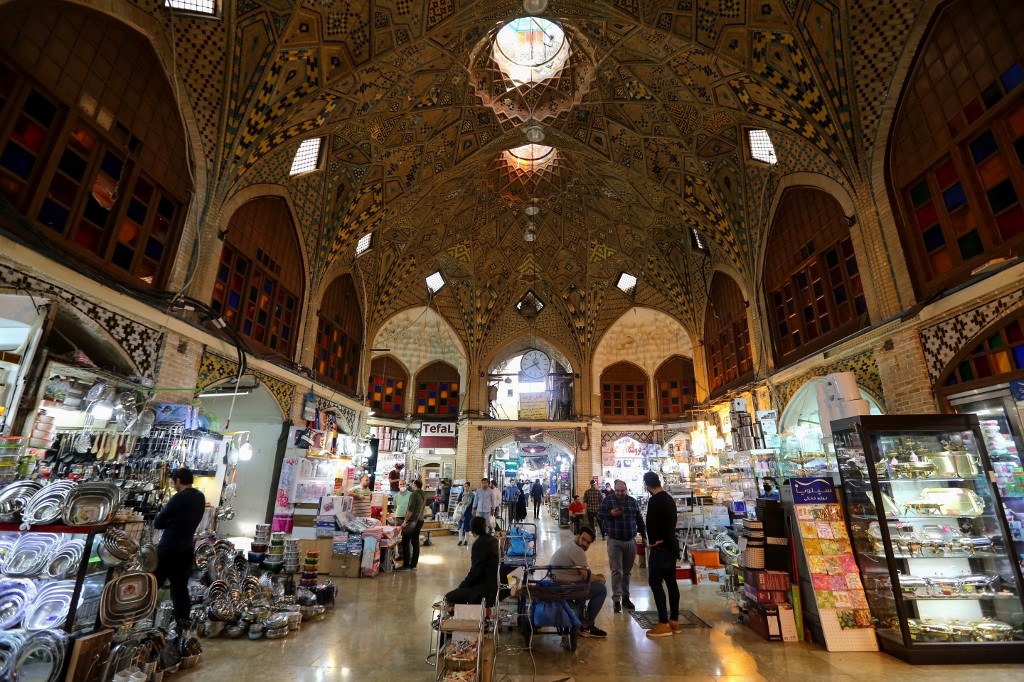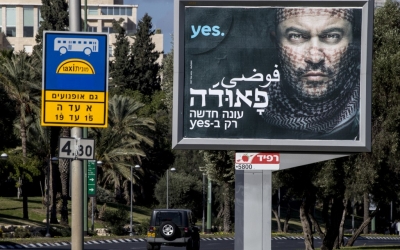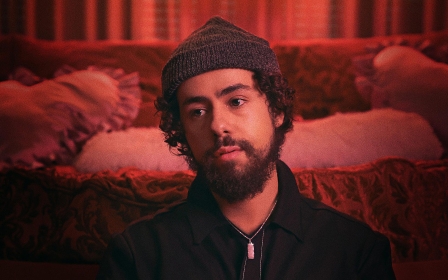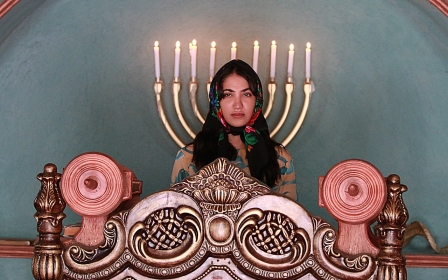Tehran: New Israeli spy thriller is Orientalist brainwashing

On 24 June, Haaretz ran the exuberant headline: “New Israeli Spy Thriller ‘Tehran’ Is Even Better Than ‘Fauda’” - the wildly popular Netflix show that gets off on Palestinian suffering while pretending not to.
The article’s author swears that the three episodes of Tehran that she viewed “reveal a television series that is outstanding, polished and very effective by American criteria”, and that “when you watch it you will curse the screen and the broadcasting corporation, because there’s no option for binge watching”.
The series is furthermore “beautifully filmed in Athens, which suddenly looks like the capital of Iran as we imagine it” - calling to mind the sensational Orientalism of like-minded productions such as Homeland, the Beirut portions of which were filmed in Tel Aviv.
'I love my hijab'
Apple TV has purchased the new show and it is, well, pretty much exactly what you would expect from an Israeli TV show called Tehran. The storyline of the first season goes something like this: a young Mossad operative named Tamar Rabinyan, who is Iranian by birth, returns to her homeland as part of a plot to hack into Iran’s air defence system and take control of its radar so that Israel can bomb a nuclear reactor.
New MEE newsletter: Jerusalem Dispatch
Sign up to get the latest insights and analysis on Israel-Palestine, alongside Turkey Unpacked and other MEE newsletters
When the first attempt fails, Tamar extricates herself from the Iranian Mossad agent who is keeping tabs on her and shows up at the house of her late mother’s estranged sister. This aunt remained in Tehran when the rest of the family relocated to Israel, and is now mother to an ultraconservative young woman named Razieh, who is preparing for a demonstration against decadent, westernised Iranian youth by making a poster that reads: “I love my hijab.”
It's anyone's guess, of course, how a show about Israeli spies running around the Iranian capital constitutes presenting a pleasant side of the country
Tamar arranges to meet up with an Iranian named Milad, an anti-government hacker with whom she has collaborated previously (although he naturally does not know the nature of her business in Iran). Milad drags her along to - what else? - the very protest Razieh is attending, which gets her kicked out of her aunt’s house and then beaten up by Razieh and accomplices. She’s subsequently taken in by Milad at the “commune” where he and his fellow troublemakers reside.
In the fifth episode, Tamar accompanies Milad to an illegal rave in the mountains outside Tehran, where she is instructed to assist in peddling ecstasy - a main source of income for Milad and co, on account of the worthlessness of their university degrees (which we are made to understand is the fault of the Iranian government). Milad informs her that ecstasy is also a public “service” of sorts, in that it “helps [people] forget their f***ing lives for one night”.
Tamar sleeps with Milad. Tamar’s father gets kidnapped in Turkey by an Iranian agent. Milad finds out Tamar isn’t who she says she is. Tamar’s Mossad commander shows up in Tehran and instructs Tamar on the matter of which server to hack. The hacking is successful, and Israeli planes head for the reactor, convinced that they are invisible to Iranian radar. They come under attack, and it turns out the Mossad commander is working for Iran. Tamar and Milad ride off on a motorbike - and that’s the end of season one.
Israeli-Iranian disconnect
According to Moshe Zonder, a co-creator of Tehran who also co-wrote Fauda, the new series “presents a different, pleasant side of Iran, which as far as I know, no western series has ever shown”. It’s anyone’s guess, of course, how a show about Israeli spies running around the Iranian capital constitutes presenting a pleasant side of the country.
But Zonder is sure of it, and also hopes that the series “will do something to help with the total disconnect between Israelis and Iranians”. Indeed, just imagine if the Islamic Republic were to produce a series called Tel Aviv about Iranian spies trying to blow up Israel: there’d be all sorts of de-disconnecting!

An AFP article notes that Zonder likes to think of the show “as at least a cultural co-production … ‘We speak more Farsi than Hebrew in Tehran … so to a certain extent, I would like to think that it is an Israeli-Iranian series, although officially it is not’”. Niv Sultan, the Israeli actress who plays Tamar, has earned much fawning praise for supposedly mastering Farsi in four months for the role.
In an interview with Haaretz, Zonder explains that, while he doesn’t “identify” with Iran’s “Great Satan” and “Little Satan” distinctions, he “can understand where it comes from” - and then launches into a history lesson about former Iranian Prime Minister Mohammad Mosaddegh’s nationalisation of the Iranian oil industry in 1951.
“He initiated reforms and tried to help his citizens,” Zonder says. “Two years later, the CIA helped get him deposed and replaced him with the young shah [Mohammad Reza Pahlavi], who was a tyrant and, among other things, a good friend of Israel’s. Our people trained the men of the SAVAK, the secret police that operated brutally on [the shah’s] behalf.”
'Iran is no paradise'
Curiously, however, exactly none of this information is addressed in Tehran. Instead, all we get are various characters lamenting how Iran used to be so great before the clerics destroyed it.
In the end, after all, the creators of Tehran aren’t really interested in legitimising pro-government Iranians; there is a specific cohort that is deemed worthy of legitimisation and promotion to the frontlines of Iranian identity. As Zonder tells Haaretz: “Tehran’s young people have a whole avant-garde scene, underground and thriving, with lots of sex, drugs and rock ‘n’ roll. There’s also a well-developed LGBT scene in Tehran and you can see pride flags at the protest demonstrations.”
The first episode alone features not only an Iranian official smacking a female tourist in the airport, but also a public hanging
Quickly on the heels of these observations comes the reminder: “But Iran is no paradise and the ayatollahs’ regime is an oppressive, threatening and frightening one.” Obviously, the country that merely massacres and ethnically cleanses the people whose land it stole in 1948 is nowhere near as objectionable.
Similar sentiments are conveyed by Tehran director Daniel Syrkin in an Israeli television interview, in which he rues the fact that Iran - a “huge country” with an “ancient culture” and some “hundred million people” - is “portrayed in Israel just through, you know, the narrow scope of what our leaders want us to see”.
Of course, Israeli leaders will have to look hard to find stuff to complain about in Tehran; the first episode alone features not only an Iranian official smacking a female tourist in the airport, but also a public hanging.
Israeli propaganda
Enter Milad and his ilk - the “youngsters who want a new life” - and Syrkin remarks: “For me, for us, I think that’s the most important thing … You see these young Iranians and you think, hey, they can be having a beer here in Jaffa on the beach. Or in Tel Aviv. They look the same, they have the same aspirations, and they’re just youngsters like us, they just wanna live.” (For the record, so do Palestinians.)
As for the majority of the Iranian population that does not qualify for hypothetical beer-drinking in Jaffa, these people are effectively rendered inauthentic, backwards and extreme.
Granted, the demonisation is not full-out, and even pro-government characters are humanised to varying degrees. But subtle brainwashing can be just as dangerous - or even more so.
The AFP article quotes Zonder as affirming that “placing a woman at the heart of this new action series was a political decision … It is definitely a feminist series”. Haaretz agrees that the heroine is “fighting for her place in a patriarchal world”. In short, Tehran doesn’t just normalise Israeli spying; it makes it downright revolutionary.
One of the advertisements for Tehran reads: “Once you’re in, there’s no way out.” Unfortunately, the same can be said for Israeli propaganda.
The views expressed in this article belong to the author and do not necessarily reflect the editorial policy of Middle East Eye.
Middle East Eye delivers independent and unrivalled coverage and analysis of the Middle East, North Africa and beyond. To learn more about republishing this content and the associated fees, please fill out this form. More about MEE can be found here.






